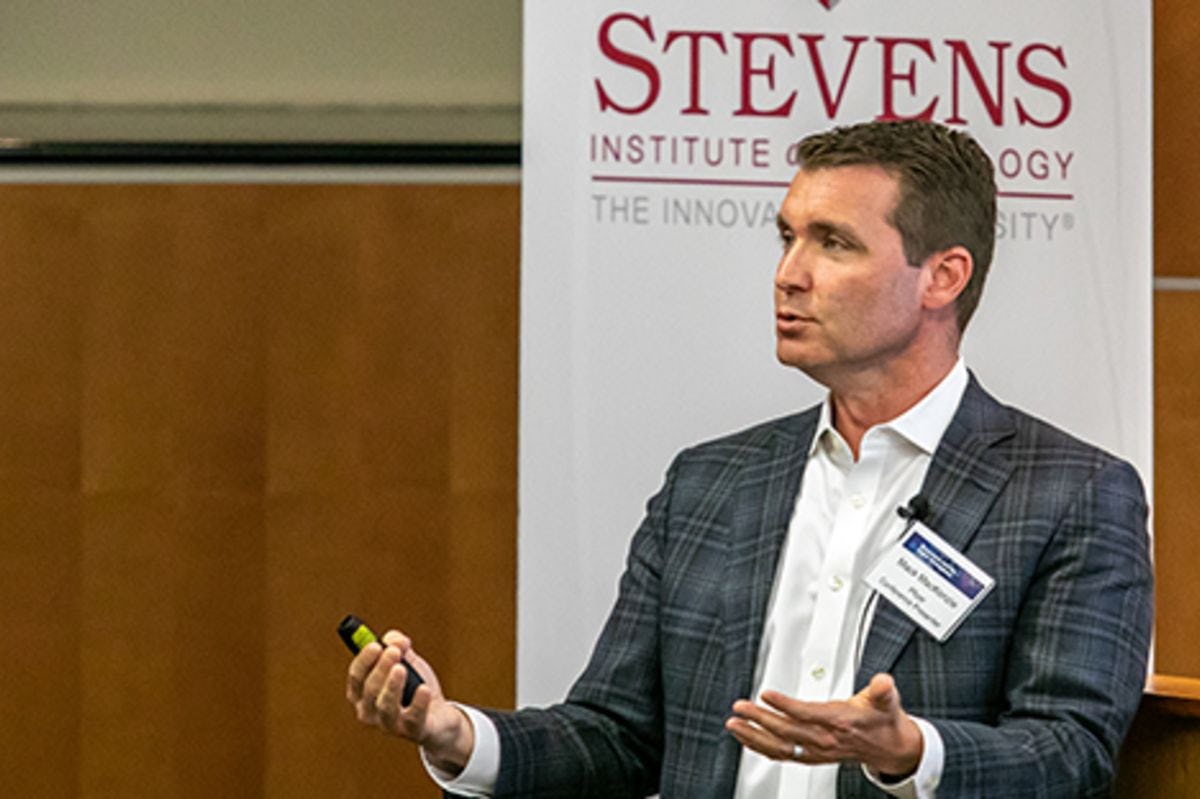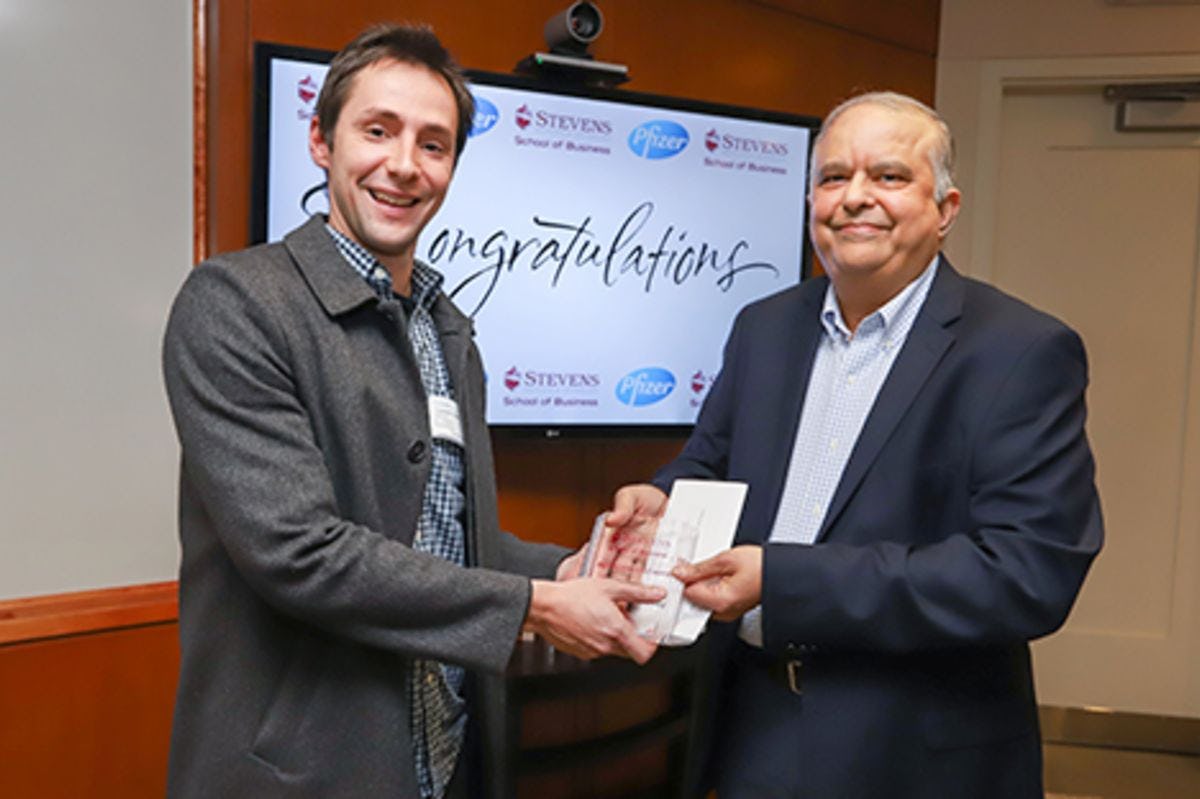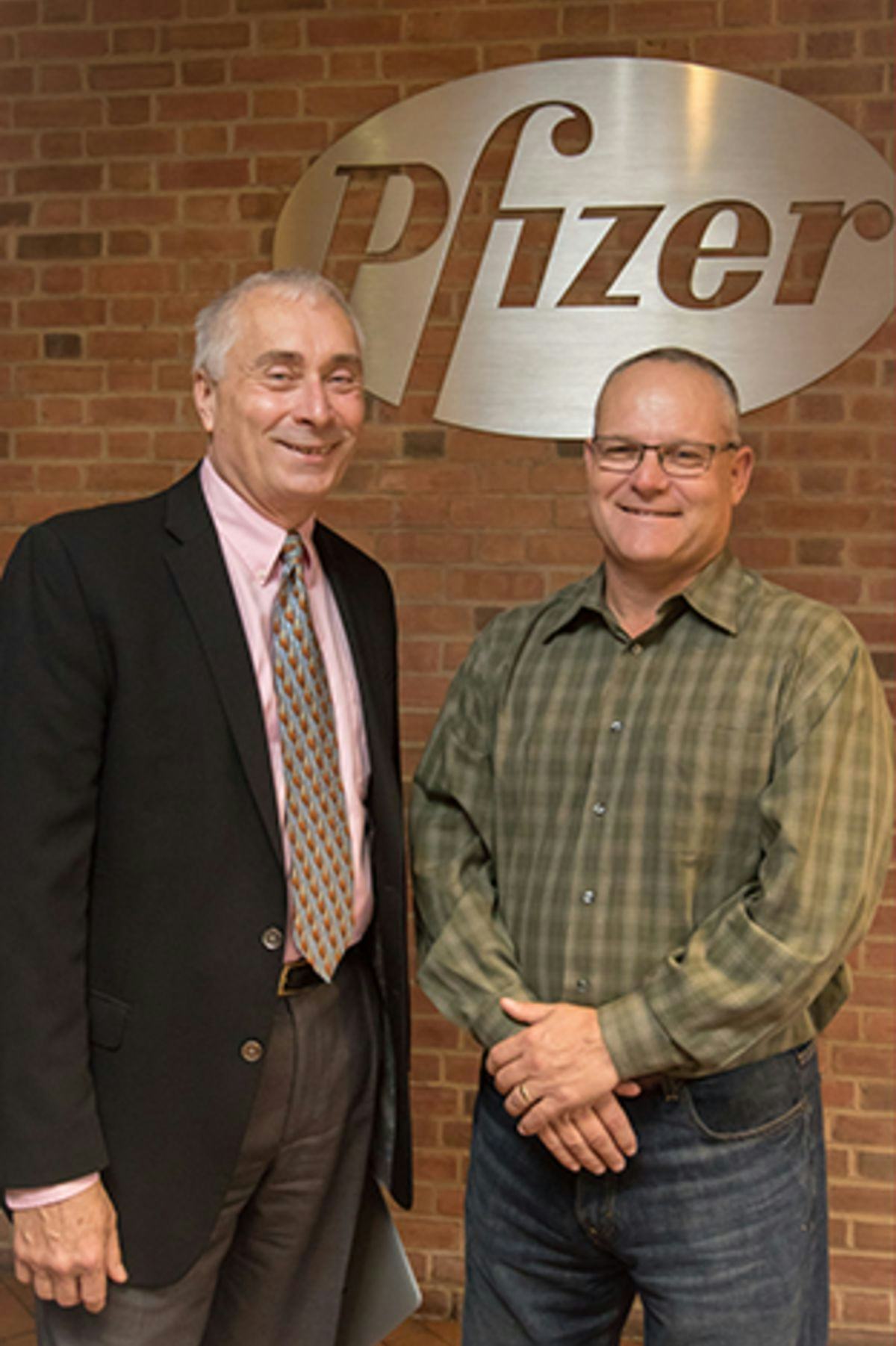A Prescription for Innovation: Pfizer-Led Blockchain Initiative Has its Roots in MBA Classes
Graduation Ceremony for Nearly 50 Pfizer Colleagues Completing Business Degrees a Chance to Reflect on Big Ideas, Stronger Networks
If blockchain has the kind of seismic impact on the pharmaceutical industry that most experts expect, Pfizer will owe part of its prescience to Glenn MacKenzie.
MacKenzie — “Mack” to his colleagues at Pfizer, where he was recently promoted to vice president of core commercial and revenue management solutions — encountered blockchain as part of a class exercise in his Stevens MBA. That experience was his first step in understanding how blockchain applications might soon revolutionize the healthcare industry.
“As your career progresses, it’s difficult to stay on top of current technology,” MacKenzie said. “Stevens taught us new techniques, but also a way of looking at the world, of searching for new discoveries, which is how I came across blockchain.”
MacKenzie was among the honorees at a recognition ceremony in April for nearly 50 Pfizer colleagues at the company’s Peapack-Gladstone campus who were completing graduate business programs from Stevens Institute of Technology.
Practical blockchain applications
When it comes to blockchain, as MacKenzie would tell you, it’s not just about the tech but about how you position the business to take advantage of such enabling platforms. Successful applications of blockchain involve broader shifts of how companies communicate and manage processes. MacKenzie played a key role in Pfizer’s co-development of MediLedger, an open, decentralized network to help pharmaceutical companies improve their financial and supply chain operations.
MediLedger leverages blockchain to transform and improve business practices for its participants, which include the three largest U.S. wholesale drug companies and four of the top 10 biopharmaceutical firms. MacKenzie said its current focus centers on compliance with the federal Drug Supply Chain Security Act, an ambitious regulation designed to trace each medicine on the market in the United States, in order to better safeguard patients against counterfeit drugs.
MacKenzie, who received an award at the ceremony for exemplifying the Stevens strategic tenet of creating impact through collaboration, said it was gratifying to see classmates in his MBA program become more confident, capable leaders through the shared experience of taking classes at their worksite during weekday evenings, not to mention learning from accomplished researchers whose discoveries are changing how companies use data and technology to create opportunities.
“Stevens has some of the best minds in analytics anywhere, and the people on my team who went through this program received best-in-class skills in analytics, which represents an opportunity for us to continue to grow, as professionals and as an organization,” MacKenzie said.
An emphasis on applied analytics
For Viswanath Narayan, who completed his master’s in Business Intelligence & Analytics, the immersion in applications of business analytics challenged him to go beyond what was taught in class.
“It’s not just the learning itself, but the emphasis on how to apply it, and I could see a direct application of what I studied to my work,” said Narayan, director of supply chain analytics, who was chosen Most Outstanding Student in the BI&A program by his peers.
It was also a chance, he said, to see how his colleagues in other departments used analytics in their day-to-day roles, creating “a cross-pollination, within the company, of what different kinds of analytics problems we have and how teams were trying to solve them.”
Colleagues throughout Pfizer take part in Stevens programs, facilitating strong cooperation across business units, from marketing, to supply chains, to quality control. That’s one reason Kevin Nepveux, vice president of global technology services for Pfizer Global Supply, championed the collaboration with Stevens.
“To be truly effective in a highly matrixed organization, you need collaboration with other parts of the company, you need to communicate and motivate effectively, and you have to be able to align your work with the goals of the company,” Nepveux said. “The Stevens program helps us break down silos and complete enterprise-wide projects with greater ease.”
Stevens classes teach a range of skills that can help create opportunities for professionals to take on complex assignments and advance their careers. John Alleyne was able to apply design-thinking strategies in areas focused on improving energy use across the business. It’s something he learned from Dr. Peter Koen, whose Human-Centered Design class teaches novel approaches to solving complex problems.
Alleyne said he felt he was able to present himself much better because of his work in the MBA program.
“Stevens taught me new techniques for leading creative innovation,” he said. “I learned a lot about how to make better decisions, provide specific feedback, listen effectively and design the correct solutions before you get into the work of actual coding.”
Since enrolling at Stevens, Cindy Dever has become a senior manager of marketing and strategy development at Pfizer — a testament to both her professional dedication and her MBA studies. A course taught by Dr. Pete Dominick convinced her leaders were made, not born.
“He said that in class, and I remember thinking to myself that it sounded like a nice idea, but it wasn’t me,” said Dever, selected Most Outstanding Student in the MBA program by Stevens faculty. “But looking back over my time at Stevens, I realized he was right, and it happened to me. And I see the same thing in my colleagues in the program — they’re more confident in front of the room, and they have a network that supports them, that they can bounce ideas off of.
“A program like this lets you explore different areas and challenges you to push past the boundaries that define you — it lets you find your most authentic self.”






